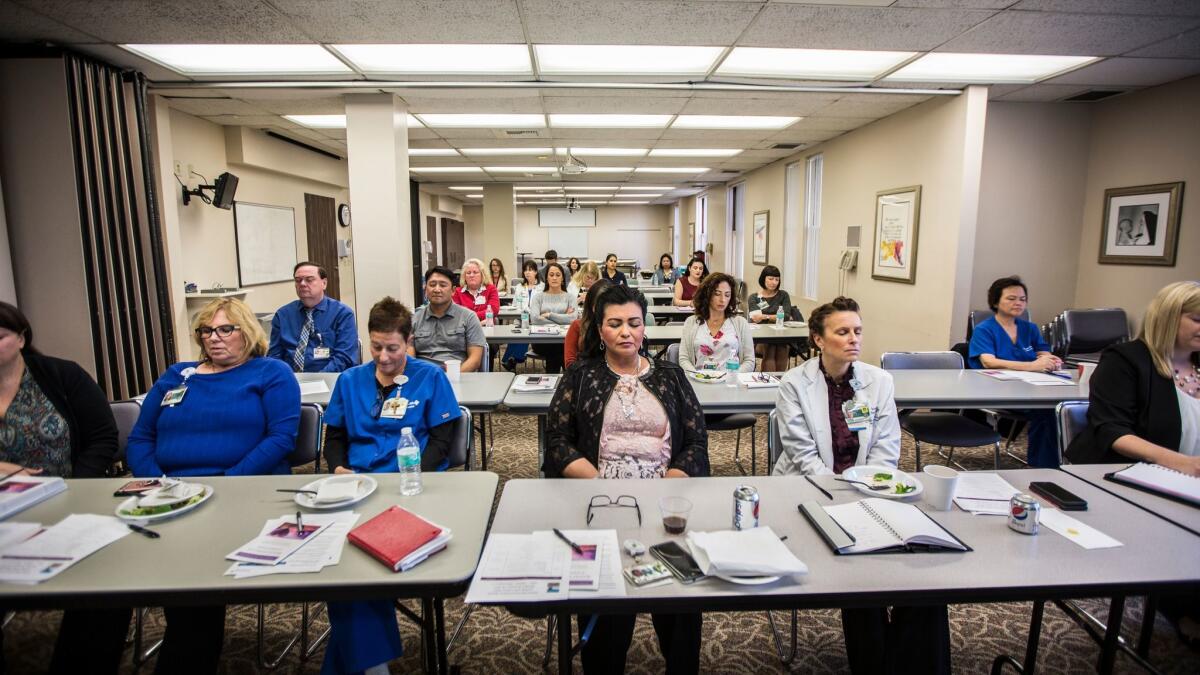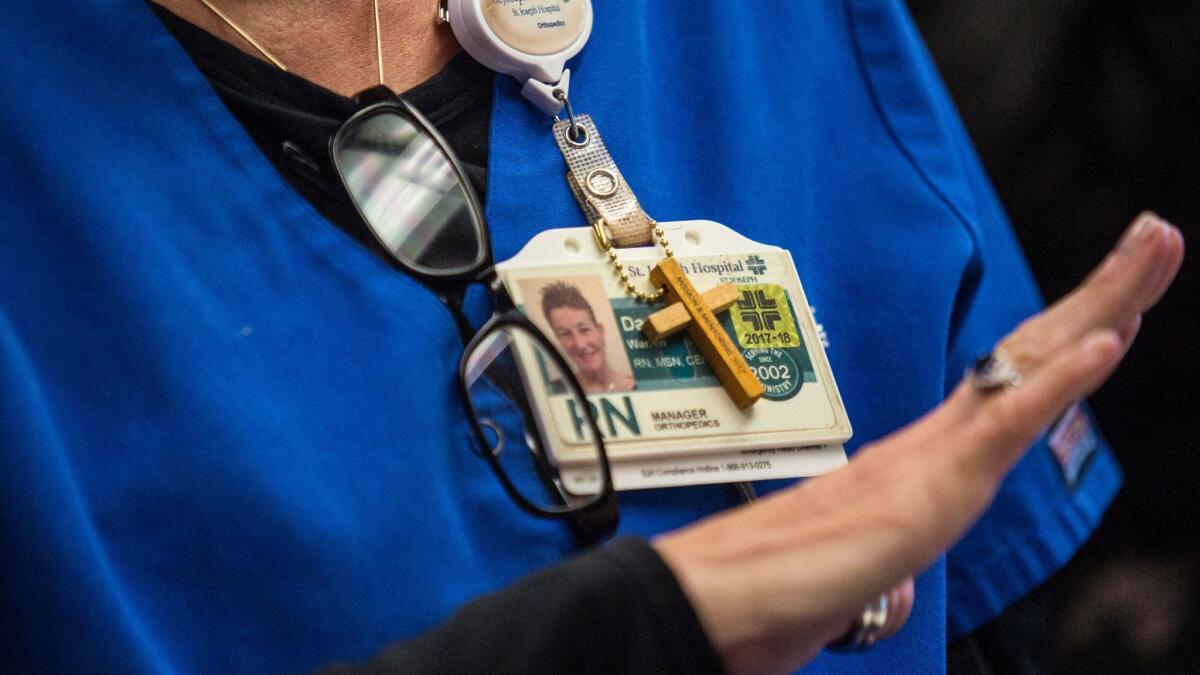As health workers deal with mass shootings and fires, more hospitals are looking to help them cope

- Share via
The tragedies that play out in hospitals affect not just patients and their families, but the nurses and doctors who care for them.
In one day, a hospital staff could treat a child gravely injured in a car accident, lose a patient to a terminal illness and comfort a family member whose loved one is in surgery.
Healthcare workers develop a sort of emotional armor, but it can wear thin. Many say they need space to decompress after regularly witnessing the most devastating moments of people’s lives.
“If we carried every single one of these deaths with us, we wouldn’t even be walking anymore,” said Darlene Warren, a nurse at St. Joseph Hospital in Orange. “You have to get rid of it.”
Hospital administrators nationwide are increasingly recognizing the toll of health workers’ day-to-day duties and the risk of burnout and symptoms similar to post-traumatic stress disorder. The problem has been garnering more attention amid recent mass shootings and destructive fires.
Jessica Thomas, a critical care nurse who started a program at USC to address secondary trauma, said caregivers who don’t talk about their suffering might shut down and stop bonding with patients altogether.
“It’s really hard to admit you can’t handle it,” Thomas said. “But the very thing that makes us good caregivers, in terms of being able to connect with people, can also be the most dangerous thing for your career when you get your heart broken.”
‘It reminds you of your brother, your sister, your mother, and that’s when you cry’
At lunchtime on a recent weekday, dozens of staff from St. Joseph Hospital shared stressful on-the-job experiences. The hospital recently began a program called Code Compassion that hosts these regular meetings.
One woman described an agitated patient who grabbed a nurse and pulled her too close, frightening her. Another said her staff were upset after a patient repeatedly asked not to be seen by healthcare workers of a certain race.
Linda Boose-Shutes, a nurse at the hospital, said seeing hundreds of deaths doesn’t make you immune to loss.
“It reminds you of your brother, your sister, your mother, and that’s when you cry,” she said.

The Code Compassion program also allows employees who feel stressed to call the hospital operator, who alerts a staff member who will come find them and bring water bottles, cookies and pretzels.
That gives the employee a few minutes to talk about and process their negative feelings, said Gemma Seidl, the program’s architect and executive director of critical care for the hospital.
“There wasn’t an avenue for ‘take a deep breath and I’ll take care of it,’” she said.
First responders can also suffer from PTSD
In 2004, North Hawaii Community Hospital launched one of the first such programs, called Code Lavender.
The hospital, in the northern part of the Big Island, offers aromatherapy, reiki and pet therapy. The Code Lavender program was named after the emergency alert Code Blue — but instead references essential oil that promotes relaxation — and was started for patients, but soon expanded to include staff, said hospital spokeswoman Lynn Scully.
Because it’s a small community, staff may know the young boy who was brought in after a serious skateboarding accident, she said. Patients may be related to someone who works at the hospital. Anyone who needs a few minutes to recuperate can call a Code Lavender and talk to colleagues in the hospital chapel.
“There’s no on-stage and off-stage, you have to be ready to go all the time,” Scully said. “You have a really hard job — sometimes it’s even harder when it’s stuff like that — and we’re acknowledging that.”
Studies have suggested that repeatedly dealing with trauma leads to more anxiety in healthcare workers, as well as more drinking and other coping behaviors. Researchers say that years of helping people in stressful situations can cause symptoms that mimic the PTSD that’s common among people who’ve suffered a traumatic experience firsthand.
The U.S. Department of Justice created a Vicarious Trauma Toolkit to address the work-related trauma that first responders, social workers and others may have after working with victims of crimes or other tragic events. Vicarious trauma can cause people to feel hopeless, fatigued, aggressive or scared.
USC’s Thomas recalled a 26-year-old man who was in the hospital for months and died waiting for a heart transplant. The nurses had befriended him and his family as they kept his spirits up.
“It’s like losing a friend,” she said. “It was just devastating.”
If an organization doesn’t address that pain as normal, the negative feelings can chip away at workers’ identities and make them feel as though they’re not cut out for the job, said Thomas, who is the clinical director of the Emergency Department at USC Verdugo Hills Hospital. It can also cause them to become less compassionate over time, a phenomenon known as compassion fatigue.
Healthcare leaders need to create a place where workers can say they’re not up for a certain task and be met with, “‘It’s OK, I still respect you and I think you’re awesome,’” Thomas said.
Thomas started a Code Lavender program at USC two years ago that delivers a “healing” basket with tea, lotion and other calming products to anyone in need. Her program was inspired by one at Cleveland Clinic, where she used to work.
Jessica Shaw, a professor in the Boston College School of Social Work, said the need for such programs for caregivers and first responders has become especially clear in the aftermath of mass shootings and other major tragedies.
“We have folks who are in hospitals just mopping up blood. … We need to really attend to their health,” Shaw said.
At St. Joseph Hospital, a Code Compassion has been called 12 times since the program was launched in July. Once was in October, when staff were worried about a colleague who was at the music festival in Vegas that was terrorized by a gunman.
Seidl said hospital staff have been asking her to hold the group meetings more frequently.
“Times have changed, and there’s so much craziness on top of what we do,” she said.
Twitter: @skarlamangla
ALSO:
Why hasn't California cracked down on anti-vaccination doctors?
Pharmacies now can offer birth control to women without a prescription, but few do
Sign up for Essential California
The most important California stories and recommendations in your inbox every morning.
You may occasionally receive promotional content from the Los Angeles Times.








